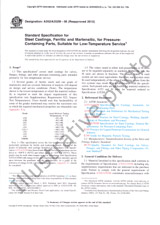We need your consent to use the individual data so that you can see information about your interests, among other things. Click "OK" to give your consent.
ASTM F997-18
Standard Specification for Polycarbonate Resin for Medical Applications
Translate name
STANDARD published on 1.12.2018
The information about the standard:
Designation standards: ASTM F997-18
Publication date standards: 1.12.2018
SKU: NS-936520
The number of pages: 3
Approximate weight : 9 g (0.02 lbs)
Country: American technical standard
Category: Technical standards ASTM
The category - similar standards:
Other standards related to laboratory medicineThermoplastic materials
Annotation of standard text ASTM F997-18 :
This specification covers the general, physical property, and biocompatibility requirements, and the associated test methods for establishing a reasonable level of confidence concerning the performance of unfilled thermoplastic polycarbonate resin for use in the manufacture of medical devices or the components thereof.
Keywords:
plastics (thermoplastic), plastic surgical devices/applications, polycarbonate (PC) plastics, polymers-surgical applications, resins-polycarbonate, seals,, ICS Number Code 11.100.99 (Other standards related to laboratory medicine), 83.080.20 (Thermoplastic materials)
Additional information
| 1. Scope | ||||||||||||||||||||||||||||||||||||
|
1.1 This specification covers polycarbonate resin and provides requirements and associated test methods for this thermoplastic when it is to be used in the manufacture of medical devices or components of medical devices. 1.2 As with any material, some characteristics may be altered by the processing techniques (such as molding, extrusion, machining, assembly, sterilization, and so forth) required for the production of a specific part or device. Therefore, properties of fabricated forms of this resin should be evaluated using those test methods that are appropriate to assure safety and efficacy. 1.3 The properties included in this specification are those applicable for polycarbonate only. The biocompatibility of plastic compounds made up of polycarbonate resin containing colorants, fillers, processing aids, or other additives, as well as polymer blends which contain polycarbonate, should not be assumed. The biocompatibility of these modified polycarbonates must be established by testing the final (end-use) compositions using the appropriate methods of evaluation. In addition, the biocompatibility of the material depends to a large degree on the nature of the end-use application. It is, therefore, necessary to specify a set of biocompatibility test methods for each new and distinct application. 1.4 This standard does not purport to address all of the safety concerns, if any, associated with its use. It is the responsibility of the user of this standard to establish appropriate safety, health, and environmental practices and determine the applicability of regulatory limitations prior to use. 1.5 This international standard was developed in accordance with internationally recognized principles on standardization established in the Decision on Principles for the Development of International Standards, Guides and Recommendations issued by the World Trade Organization Technical Barriers to Trade (TBT) Committee. |
||||||||||||||||||||||||||||||||||||
| 2. Referenced Documents | ||||||||||||||||||||||||||||||||||||
|



 Cookies
Cookies
